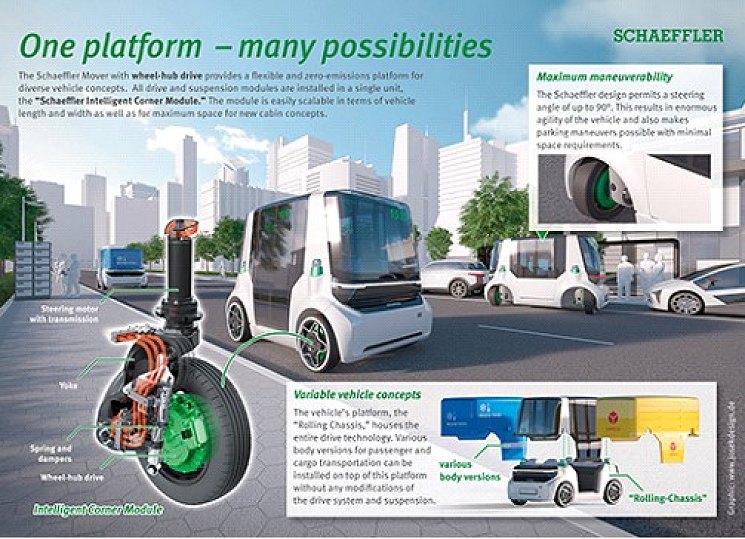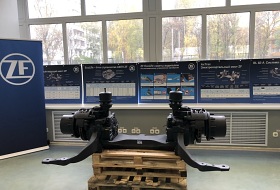Urban vehicle concept for the future: “Schaeffler Mover” powered by innovative wheel modules

The “Schaeffler Mover” urban vehicle concept is making its debut at the 11th Schaeffler Symposium. The technology company has developed a compact wheel module that combines the drive and chassis components of this vehicle that is designed for fully autonomous operation. This “Intelligent Corner Module” enables a high degree of vehicle maneuverability whilst at the same time offering a very high level of comfort for passengers. The technology platform of the “Schaeffler Mover” has an adaptable design that allows the flexible implementation of different vehicle bodies ranging from a robo-taxi to an autonomous delivery vehicle. This concept is Schaeffler’s answer to the challenge of meeting the mobility requirements of people in rapidly growing metropolitan areas.
BADEN-BADEN, April 12, 2018. It is expected that two thirds of all people will live in a city by the year 2050. The greater population density of living spaces will also change the way that people travel in cities and how they are supplied with goods for day-to-day use. Autonomous and electrified vehicles will play an important role here, particularly in the form of the new robo-taxis, or people and goods movers, which will supplement or even replace local public transport in cities. Schaeffler is providing the technical basis for an urban mobility concept of this kind: The “Schaeffler Mover” with wheel hub drive and 90-degree steering system offers a platform for a wide range of vehicle concepts such as robo-taxis or autonomous transport vehicles.
The “Schaeffler Mover’s” drive and chassis components are combined in a space saving manner in a compact unit, the “Schaeffler Intelligent Corner Module”. This module is installed in all four wheels and includes the wheel hub motor, wheel suspension including the spring system, and the actuator for the electromechanical steering system. The steering system of the wheel module is designed as an electromechanical steer-by-wire system. The wheel suspension design selected enables a steering angle of up to 90 degrees. This allows the vehicle to be maneuvered in narrow alleys and be parked in short parking spaces in order to let the passengers enter and exit. Its turning radius of less than five meters makes the vehicle extremely maneuverable in city traffic and even turning on the spot is possible.
The traction motor of the wheel module has been designed as a permanently-excited synchronous motor and is a variant of the wheel hub motor already developed by Schaeffler in a development project in 2013. In the current design for the Schaeffler Mover, each of the four electric motors – with 300-volt operating voltage – supplies a continuous output of 13 kilowatts and a temporary peak output of 25 kilowatts. The nominal torque of 250 Newton meters per motor can be doubled for short periods.
With its reliability, flexibility and comfort, the “Schaeffler Mover“ meets essential customer requirements for a highly automated vehicle for urban use. A specially-developed driving dynamics control system enables individual control of each “Intelligent Corner Module” and the combination of the functions of the driving dynamics control system (ESP), the distribution of torque between the driven wheels (torque vectoring), and all-wheel steering. Lateral movements of the vehicle can be performed with practically no noticeable transverse forces for the passengers, which is very pleasant for passengers who are reading, for example. At the same time, this drive concept ensures a very high level of availability and protection against failure. The entire software for the drive and steering control system including the comprehensive safety concept is from Schaeffler.
The Schaeffler module’s high level of integration has further advantages. For example, the drive and chassis system require less overall installation space – the resulting free space offers more room for passengers and stowage space for transported goods. The space created for the battery and ancillary equipment allows compact vehicle dimensions. These can, in turn, be varied because the vehicle can also be implemented as a longer and wider variant without the need to make changes to the drive and chassis system. The modular vehicle design of the “Schaeffler Mover” creates the prerequisite for implementing a large number of passenger and goods transport tasks with a largely standard chassis. The vehicle body – which can be modified for the desired application – can be quickly separated from the platform, which accommodates all the technology required for driving. Only a part of the sensor system required for autonomous driving is also integrated into the vehicle body.
Interconnection is a decisive prerequisite for smooth operation of autonomous city vehicles. Schaeffler’s experts have achieved this in the study by creating a digital twin of the vehicle, which represents an image of the actual vehicle in the cloud. Through continuous analysis of the operating and condition data, it is possible to identify future maintenance requirements in advance, for example. “This vehicle is consistently designed for interconnected operation and fills a significant gap in the current portfolio of the automobile industry”, says Schaeffler’s Chief Technology Officer, Prof. Peter Gutzmer.
The feasibility study, which can be seen at the 11th Schaeffler Symposium, will be successively developed by Schaeffler in the coming months. There are plans to produce a roadworthy prototype including the cabin and air conditioning during the course of the year.



